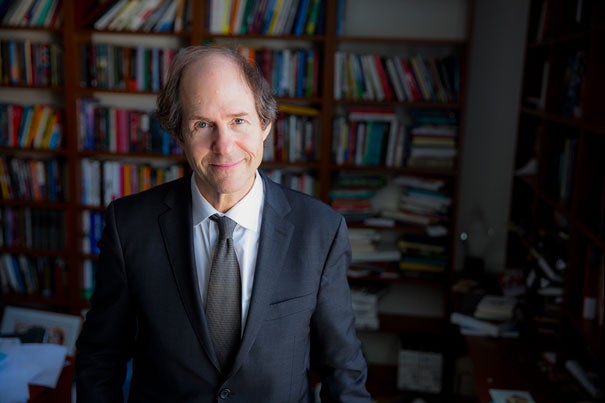The internet once promised to be the great equalizer. Technology would democratize access to information and remove barriers between people who wished to connect and share ideas, snatching power from a cluster of institutions that had controlled access, such as government and media, and giving it to anyone with a Wi-Fi connection.
Yet an unfortunate and largely unintended consequence of the rise of social media is that instead of being better informed and exposed to ever-broadening viewpoints, research shows that Americans today are more polarized and draw from shrinking pools of news. Many people now operate in virtual gated communities as a result of their culled Facebook and Twitter feeds and the opaque corporate algorithms that organize people into invisible groups.
In a new book, “#Republic: Divided Democracy in the Age of Social Media,” Harvard Law School’s Cass R. Sunstein argues that social media curation dramatically limits exposure to views and information that don’t align with already-established beliefs, which makes it harder and harder to find an essential component of democracy — common ground.
In an email exchange, Sunstein, the Robert Walmsley University Professor at Harvard, talked about how America needs to restore “serendipity” online and bring back the conditions necessary for a healthy democracy in the digital era.
GAZETTE: We’re becoming more isolated from a diversity of opinions and information and more closely connected to a homogenous cohort. How did this happen, and was it anticipated?
SUNSTEIN: A lot of people love reading things that fortify and confirm their own opinions — and, by definition, people like reading about topics that interest them. So, freedom of choice can produce self-sorting, in which people enter echo chambers or information cocoons. Each of us can create and live in a “Daily Me.” That was not widely anticipated. I wouldn’t say that we are now more isolated from diversity; there’s a lot of diversity out there, in terms of how isolated people are from diversity. But many people do like to isolate themselves, and that’s a big problem.
WATCH: Cass Sunstein discusses his book “#Republic: Divided Democracy in the Age of Social Media” at a book event hosted by the Harvard Law School Library on March 22.
GAZETTE: It’s natural for people to want to avoid things they find irritating or even offensive, and yet you argue that curating your information diet to only reflect what you prefer is damaging. What are some of the actions or seemingly reasonable choices people are making that harm them individually? And while it’s certainly not good intellectually, how does the fragmentation or compartmentalization of news/information undermine democracy?
SUNSTEIN: The biggest issue is simple. It’s group polarization, which means that if you listen to people like you, you’ll probably get more extreme and more confident too. If Republicans talk or listen to each other, they’ll probably become more extreme, and the same is true for Democrats. We’ve seen plenty of that, and we’re going to see more. By the way, it happens on university campuses on both the left and the right, and we should worry about both. (I worked in the Obama administration, and I am worried that the left might go nuts in coming years.) In Washington, group polarization makes sensible compromises more difficult and also makes it much harder for people to learn from each other. Some issues — consider increases in the minimum wage — are pretty complicated, and mutual learning is indispensable.
GAZETTE: What are some of the “preconditions for maintaining a republic?”
SUNSTEIN: A capacity to listen, a commitment to reason, a belief in the good faith of (most) people who disagree with you, a desire to participate, love of country, a concern for the direction in which your country is moving. (Also, a sense of humor, and probably an appreciation of music too.)
GAZETTE: You call for an “architecture of serendipity.” What do you mean, why is that important, and what are some of the obstacles or incentives that might hinder its construction?
SUNSTEIN: It’s great if you come across ideas and topics that you didn’t specifically select. That can change your day and even your life. A great city exposes you to all sorts of people and ways of life, serendipitously. A great university does the same. So does a well-functioning information market. Serendipity is crucial because it expands your horizons. You need that if you want to be free.
GAZETTE: How can that happen amid the growing prevalence of “fake news,” including a misinformation campaign apparently mounted by the Russians during the 2016 election, and other targeted efforts to bombard users with propaganda in order to drown out legitimate voices and news sources?
SUNSTEIN: We need to go on several different paths, and at the same time. Serendipity can be promoted by platforms (technology types are already on this), and fake news can be combated by reality checks. Facebook is interested in the latter. I would also emphasize that a sensible government needs to allow people who know what they’re doing to apply their expertise (for example, to reduce deaths on the highway), whatever the background noise from Facebook or Twitter.
GAZETTE: So what can be done to rectify the compartmentalization? And do platforms like Facebook, Google, Twitter, and others have an obligation to adjust and be more transparent about how they’re selecting what information we see? Is Facebook’s new “disputed” tag to alert readers to fake news an adequate fix?
SUNSTEIN: For that one, you’re going to have to read the book.
This article was originally published in the Harvard Gazette on March 21, 2017.
